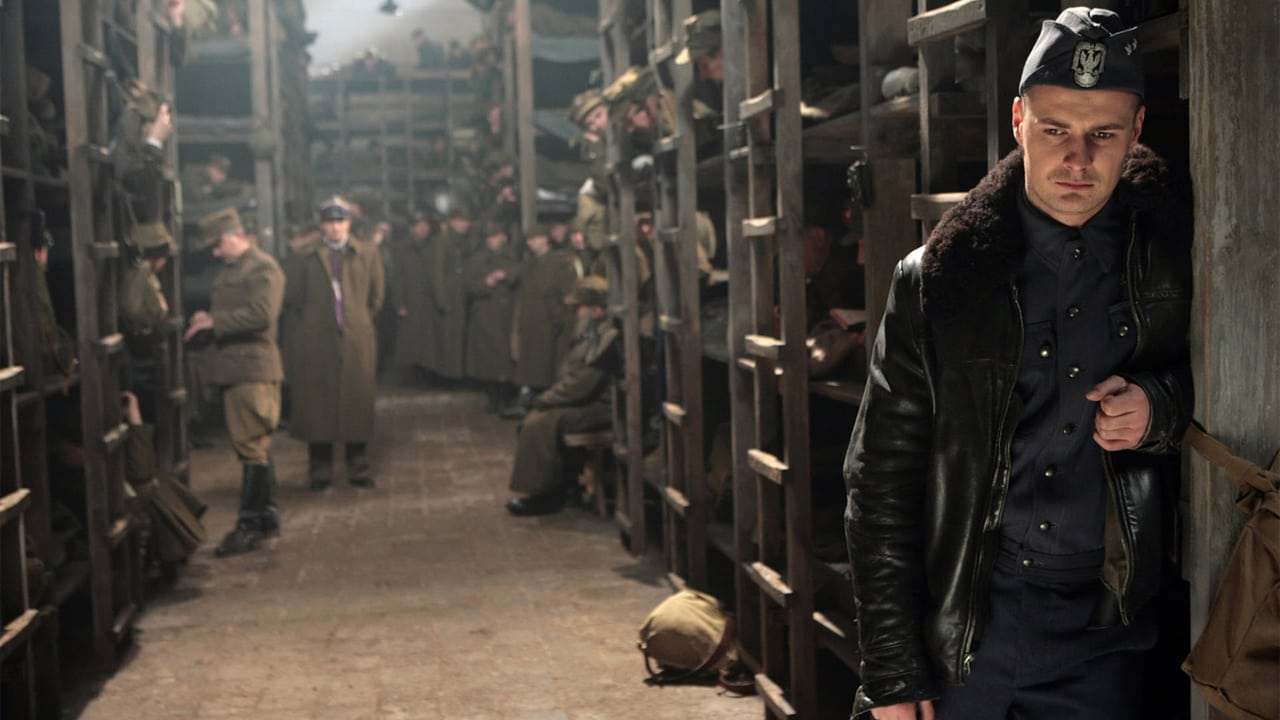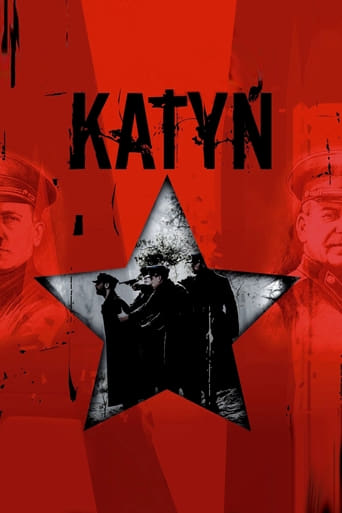Libramedi
Intense, gripping, stylish and poignant
Mandeep Tyson
The acting in this movie is really good.
Quiet Muffin
This movie tries so hard to be funny, yet it falls flat every time. Just another example of recycled ideas repackaged with women in an attempt to appeal to a certain audience.
Raymond Sierra
The film may be flawed, but its message is not.
alexdeleonfilm
KATYN: A stunning Grande Finale evokes a Silence of the Lambs ~ Viewed at the Annual Polish film week in Gdynia, September 18, 2007. The latest film by 81 year old Polish director Andrej Wajda, "KATYN" concerning the mass murder of Polish Prisoners of War perpetrated by the Russians in 1940 and for years either hushed up or cynically blamed on the Germans, is more than just another film by a famous director. It has become a "cause celèbre" and a national event stirring up the collective Polish memory of this incredible Russian atrocity"Katyn" is the name of a forest area outside of the city of Smolesk where over a three day period in May, 1940, 15,000 Polish POWs, mostly officers, were taken by the truckload and methodically dispatched one by one with a single bullet to the nape of the neck by agents of Stalin's NKVD. The nefarious purpose was to try to ensure that after the war there would be no high-level Polish military cadre left to oppose the Russification and Communization of Poland. (Talk about thinking ahead!)Stylistically, "Katyn" was apparently shot in "classical style" and, Mr. Wajda has stated that this is "the last film of the Polish School" -- a reference to the period of post-war Polish films of the fifties which put Poland on the international cinema map and of which a very young Wajda was the leading lightAs for the film itself, it turned out to be more like a religious experience than the mere viewing of a motion picture – which is not to say that "Katyn" is not successful on cinematic grounds alone – just that the cumulative effect was overwhelming – truly Over-Whelming. The picture starts in the middle of a bridge on dateline September 17, 1939 – a date which every Pole knows to be the infamous day on which the Russians invaded from the East to crush Poland and divide it up between themselves and the German invaders from the west. Crowds of civilians mixed with soldiers fleeing the Krauts run into another crowd fleeing the Russians –What to do? ~ One young woman with a small child tries to persuade her soldier husband to discard his uniform and flee with her to the relative safety of Krakow in the South. "I am an officer of the Polish Army – I can't do that" he states, invoking the aristocratic Polish military code which Wajda has called into question in many other films. – and so he falls into Russian custody, from which he will never return. Already the die of the film is cast and the subsequent events – the internment of the officers, the women back home trying to find out what happened to their men – the official lies – the cynicism – the desperate attempts to find out, the clinging to hope against hope and the frustration which is the body of the film, are all things completely, if painfully, familiar to just about every person in this country, even today. There are too many people still alive who went through it all. The bulk of the film takes place on the "home front" with notable female roles, especially dark-haired Maja Ostaszewska, to single out just one of several powerful distaff figures, and there is one important Russian character, an officer who tries to protect one of the protesting Polish women, played by the very popular Russian actor Sergei Garmash – a subtle indication that this film is not specifically anti-Russian – and then comes the Grand Finale.Switch to Katyn Forest. The trucks come rumbling in. The Polish officers are unloaded, one by one – and one by one shot in the back of the head – shoved screen forward into a gaping hole in the ground – bang-bang – push-push – plop-plop into the ditch – bodies with bloodied heads stacked up neatly like sacks of potatoes – then comes the bulldozer shoving loose dirt practically out of the screen and into the laps of the audience to cover up the obscenity – one upraised hand clutching a string of black rosary beads is the last to go under -- Screen goes black. End titles roll. No music. No sound. Nothing. Dead silence. One tiny flimsy attempt at a clip-clap is drowned out by the Silence of the Lambs as the audience files out without a word …No number of stars can rate this film.
tao902
A Polish film by Andrzej Wajda about the Katyn massacres during the 2nd World War. 15000 Polish officers and citizens were massacred in 1940 and officially the Nazis were blamed. However, a lot of evidence was revealed that indicated it was the Soviet Union that carried out the massacres.The film shows the effects the massacres had on the families of the officers. The film also shows attempts to reveal the truth in the post-war years and the brutal responses of the Soviet backed regime to cover up the truth.The retelling is inter-cut with some documentary footage from the time. Well worth seeing.
Hunky Stud
This film failed to explain why stalin ordered to kill all the officers. that was still a mystery to me after watching it. it didn't have any scenes from the Russian's perspective at all. that could have made this film much more powerful. it was just one side of story. it also didn't explain in a deeper level why the russians decide to make false accusations against the German as who killed those officers.the film itself is too long and gets boring in some scenes, and it has random short stories.it does have good cinemaphotography.the history event itself is sad, but this film didn't make me feel emotional.
Andres Salama
Veteran Polish director Andrzej Wajda take on the Katyn Massacre, the 1940 execution in a few days (probably a world record in mass murder) of some 20,000 Polish officers captured during the previous year invasion of Eastern Poland by the Soviet Union (in complicity with Nazi Germany who had invaded the western part of Poland).As the movie begins, the Polish officers are being transported in trains to the Soviet Union as prisoners. Meanwhile the Germans are also doing mischief in their controlled part of Poland, detaining the professors of Krakow University and sending them to concentration camps. After a brief interlude in World War II, the movie moves on to the post war. In new communist Poland, when one of the widows of the slain officers tries to inquire to authorities about his fate, she is told is better to kept quiet. The movie ends with a recreation of some of the executions.Aimed primarily at a Polish audience, this is a well made film, with good production values, but also curiously (for lack of a better word and given the subject matter) bloodless (the most moving part of the film is a real Nazi newsreel that shows the mass graves being exhumed by the Germans for propaganda purposes). I think it could have benefited by being less restrained and more polemical. Still, a worthy and interesting film.

